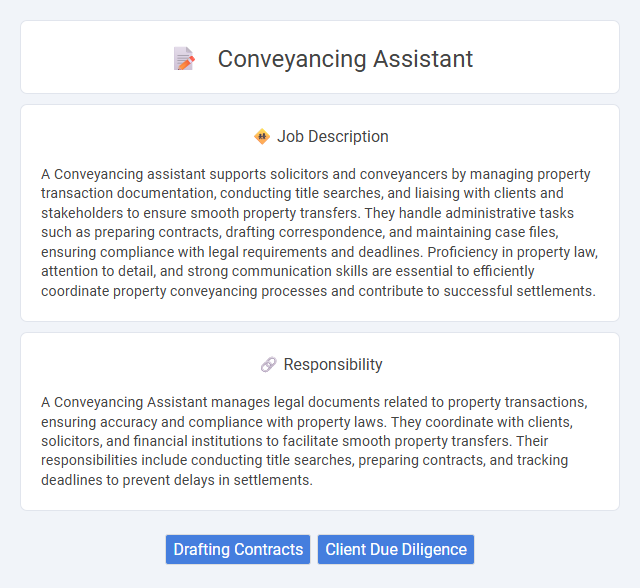
A Conveyancing assistant supports solicitors and conveyancers by managing property transaction documentation, conducting title searches, and liaising with clients and stakeholders to ensure smooth property transfers. They handle administrative tasks such as preparing contracts, drafting correspondence, and maintaining case files, ensuring compliance with legal requirements and deadlines. Proficiency in property law, attention to detail, and strong communication skills are essential to efficiently coordinate property conveyancing processes and contribute to successful settlements.
Individuals with strong attention to detail and good organizational skills are likely to be well-suited for a Conveyancing Assistant role. Those who prefer structured environments and enjoy handling legal documents might find this job aligns with their strengths. However, people who struggle with repetitive tasks or tight deadlines may find the role challenging or unsuitable.
Qualification
A Conveyancing Assistant typically requires a strong understanding of property law and legal documentation related to real estate transactions. Relevant qualifications include a diploma or certificate in conveyancing or legal studies, complemented by experience in property administration or legal conveyancing support. Proficiency in legal software and excellent organizational skills enhance the effectiveness and accuracy in managing conveyancing processes.
Responsibility
A Conveyancing Assistant manages legal documents related to property transactions, ensuring accuracy and compliance with property laws. They coordinate with clients, solicitors, and financial institutions to facilitate smooth property transfers. Their responsibilities include conducting title searches, preparing contracts, and tracking deadlines to prevent delays in settlements.
Benefit
A Conveyancing assistant role likely offers valuable experience in the legal property transfer process, enhancing organizational and communication skills. This position probably provides exposure to diverse legal documents and client interactions, supporting career growth in real estate law. Candidates may benefit from learning about compliance and property legislation, which could improve their professional expertise and job market competitiveness.
Challenge
A Conveyancing assistant likely faces the challenge of managing complex legal documentation with precision under tight deadlines. There is a high probability of encountering frequent changes in contracts that require swift adaptation and thorough understanding. Balancing multiple case files simultaneously might also present a significant organizational challenge.
Career Advancement
A Conveyancing Assistant supports solicitors and conveyancers by managing property transactions, conducting legal research, and preparing documentation. Developing expertise in property law and gaining experience in client communication can lead to promotion opportunities such as Conveyancer or Legal Executive. Continuous professional development and certification, such as obtaining the Council for Licensed Conveyancers (CLC) qualification, significantly enhance career advancement prospects in the conveyancing sector.
Key Terms
Drafting Contracts
A Conveyancing Assistant specializing in drafting contracts plays a crucial role in preparing precise legal documents for property transactions, ensuring compliance with relevant laws and regulations. They meticulously review and draft contracts of sale, lease agreements, and transfer documents to protect client interests and facilitate smooth property transfers. Expertise in contract law, attention to detail, and familiarity with real estate regulations are essential for accuracy and risk mitigation in the conveyancing process.
Client Due Diligence
Conveyancing assistants play a crucial role in Client Due Diligence by meticulously verifying client identities and assessing risk factors to ensure compliance with Anti-Money Laundering (AML) regulations. They collect and scrutinize necessary documentation, such as identification proofs and source of funds, to prevent fraudulent transactions and secure the conveyancing process. Expertise in regulatory frameworks like the Money Laundering Regulations 2017 enhances the accuracy and reliability of due diligence procedures in property transactions.
 kuljobs.com
kuljobs.com